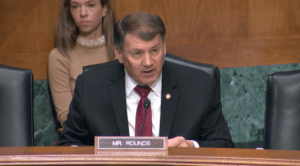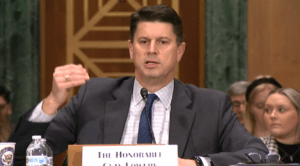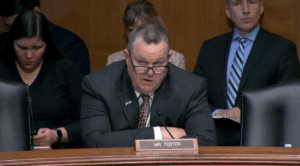Senators from farm states asked Banking Committee witnesses last week if China should be allowed to buy up arable land here in the U.S. Judging by the way they framed these questions in the Feb. 28 Senate Banking Committee hearing titled Advancing National Security and Foreign Policy Through Sanctions, Export Controls, none were in favor of it.
In 2020, a Chinese-linked company planned to build a wind energy farm project near Del Rio, Texas, only miles away from Laughlin Air Force Base, where U.S. pilots are trained. In 2022, a Chinese company attempted to build a corn milling plant on farmland near an Air Force base outside of Grand Forks, North Dakota.
 Sen. Mike Rounds (R-SD) asked former White House national security advisor for international economics, Daleep Singh, what the U.S. is doing about such investments by China, especially those near military facilities. Although he did not say this, it seems clear that Sen. Rounds was envisioning spy equipment that could pick up conversations, signal intelligence, or have other influence over personnel working at those bases.
Sen. Mike Rounds (R-SD) asked former White House national security advisor for international economics, Daleep Singh, what the U.S. is doing about such investments by China, especially those near military facilities. Although he did not say this, it seems clear that Sen. Rounds was envisioning spy equipment that could pick up conversations, signal intelligence, or have other influence over personnel working at those bases.
Singh immediately said, “Food security is economic security. Food security is national security. I think it’s as simple as that. The supply chain for food in this country has to be taken, and treated with the utmost importance in the same way that we do with foundational technologies, in the same way that we do with energy and manufactured goods.
He said if the land can be used for the purpose of spying, it would raise a red flag for the Committee on Foreign Investment in the United States (CFIUS).
CFIUS is an inter-agency committee that reviews the national security implications of foreign direct investment into the U.S. CFIUS has the power to block investments.
What constitutes a CFIUS national security concern? Two areas related to agriculture stand out. One is whether the transaction would result in foreign control over physical, critical infrastructure, which becomes open to interpretation. Is arable land a critical infrastructure? The Department of Agriculture is not part of CFIUS, but witnesses at a Feb. 28 Senate Banking Committee hearing said it should be. Moreover, if a foreign investment in the U.S. has facilities in locations near sensitive government facilities, including national laboratories or military installations, the deal would fall under CFIUS’ purview to reject or accept the purchase.
“CFIUS has the capacity to require notification for the acquisition of land above a certain threshold,” Singh told Senator Rounds, without elaborating on that threshold. “CFIUS can bring in the experts to determine whether a national security risk is implicated.”
Sen. Rounds proposed new legislation called the PASS Act. This bill was first introduced in the House by Rep. Elise Stefanik (R-NY-21) in July 2022. It is currently being read by three committees in the House. His version seeks to prohibit China from purchasing U.S. farmland and agribusiness. A Chinese company now owns the popular brand Smithfield Farms. Rounds also wanted to add the Department of Agriculture to the CFIUS agency to review foreign land and agribusiness buys.
“The agricultural industry is a significant part of not just my home state’s economy, but nationally, making it a true potential target for foreign investment,” Rounds said.
It’s true. As a side note, three Brazilian companies own the majority of the beef processing facilities in the U.S.

Clay Lowery testifies before the Senate Banking Committee on Feb. 28 in a hearing titled Advancing National Security and Foreign Policy Through Sanctions, Export Controls, and Other Economic Tools.
Clay Lowery, former assistant secretary for international affairs at the Treasury Department, and one of three witnesses at last week’s Senate Banking Committee hearing said CFIUS does have the jurisdiction to review greenfield investments in agriculture if near important government installations.
He also agreed that the Department of Agriculture “should be part of CFIUS. That’s a very reasonable idea. Right now, if there is a national security aspect to a transaction, agriculture can be brought up by CFIUS. And it has been in the past. But that doesn’t mean it shouldn’t be more of a regular operation as opposed to a kind of an ad hoc type of thing we have now.”
In 2021, the U.S. Department of Agriculture noted that foreign investors now owned over 40 million acres of our farmland. This has occurred since 2015 at a tune of about 2.2 million acres a year.
“The ag land issue is two-fold. On the one hand, we care about food security and whether or not foreign adversaries control any segment of U.S. food production. But also, we care about other intended uses of the land -such as what sorts of espionage or other activities can be conducted on land bordering U.S. military installations, or even just American businesses with proprietary information that could be left vulnerable. China investment is a two-way street. We care about what they are trying to buy and control over here, as well as what we — and other Western investors — are financing over there.” — Robby Smith Saunders, Vice President of National Security, Coalition for a Prosperous America
Sen. Katie Britt (R-AL) said her constituents in Alabama have spoken about Chinese buying state farmland.
“I agree that food security is national security and economic security, too. And I believe that one acre of our farmland owned by the Chinese Communist Party is one acre too many,” she said. “I think there’s absolutely a layer of national security involved here in allowing China to buy up farmland near our military bases. This is totally unacceptable. Agriculture needs a permanent seat at the table in CFIUS.”
Lowery agreed. “It sounds to me like this probably should be looked at in a more systematic way,” he said.
Sen. Kevin Cramer (R-ND) watched his state shoot down a China-attempted purchase of a grain mill near a military base. The purchase, put forth by Fufeng Group, a private company, was killed last month by North Dakota and not by CFIUS.
“I cannot tell you how disappointing I was in CFIUS after not just the 45-day review, but then another 20 days added to that in order to get further information only to conclude clumsily non-jurisdiction over an agribusiness 12 miles from a military base and a Low Earth Orbiting satellite ground station,” he said, suggesting the Grand Forks grain mill acquisition by Fufeng was not deemed a national security risk by CFIUS. “Because of the CFIUS, we had the completion of a sale that should never have taken place. The Air Force finally corrected that error and stated emphatically in a letter that this poses a significant risk to the Grand Force Air Force Base,” he said.
 Sen. Jon Tester (D-MT) warned that it would be easy for foreign companies to create shells, based offshore in the Caribbean or even Canada and Delaware for that matter.
Sen. Jon Tester (D-MT) warned that it would be easy for foreign companies to create shells, based offshore in the Caribbean or even Canada and Delaware for that matter.
Lowery said the workload at CFIUS to look into such matters was enormous. Instead of dealing with 100 or so transactions annually, Lowery said CFIUS is now dealing with over 400 requests to reveal deals.
“For CFIUS, it is going to be a matter of how big of a deal is this question of China buying up farmland and agribusiness,” Lowery said. “Is there a lot of foreign ownership? I’d say probably not. If we are going to look at every single transaction that takes place on farmland from foreign buyers because of your concern about shell companies, that could be a fairly significant expansion of CFIUS’ workload.”
Tester admitted that he does not know how big of an issue this is nationwide, but on a state level…farmers and ranchers are talking.
“We don’t know how big of an issue this is nationally, but I can tell you that Montana is a pretty good-sized state. It’s 540 miles long and 400 miles wide. I haven’t had one yet where this issue hasn’t either been brought up in public or in private,” he said.
“There’s land transfers happening all over the place here. We need to get our hands on it. China’s surveillance balloon should have been a wake-up. I know that people are going to say this can’t be done. But I think this is a huge issue,” Tester said. “It’s a huge national security issue. We should not be allowing countries who don’t give a damn whether we exist or not owning our land, whether it’s farmland or agribusiness,” he said, then in a dig that many Montana soy farmers might take the wrong way, concluded with, “China is not our friends.”
Senate Banking Committee Asks: Should China be Allowed to Buy U.S. Farmland?
Senators from farm states asked Banking Committee witnesses last week if China should be allowed to buy up arable land here in the U.S. Judging by the way they framed these questions in the Feb. 28 Senate Banking Committee hearing titled Advancing National Security and Foreign Policy Through Sanctions, Export Controls, none were in favor of it.
In 2020, a Chinese-linked company planned to build a wind energy farm project near Del Rio, Texas, only miles away from Laughlin Air Force Base, where U.S. pilots are trained. In 2022, a Chinese company attempted to build a corn milling plant on farmland near an Air Force base outside of Grand Forks, North Dakota.
Singh immediately said, “Food security is economic security. Food security is national security. I think it’s as simple as that. The supply chain for food in this country has to be taken, and treated with the utmost importance in the same way that we do with foundational technologies, in the same way that we do with energy and manufactured goods.
He said if the land can be used for the purpose of spying, it would raise a red flag for the Committee on Foreign Investment in the United States (CFIUS).
CFIUS is an inter-agency committee that reviews the national security implications of foreign direct investment into the U.S. CFIUS has the power to block investments.
“CFIUS has the capacity to require notification for the acquisition of land above a certain threshold,” Singh told Senator Rounds, without elaborating on that threshold. “CFIUS can bring in the experts to determine whether a national security risk is implicated.”
Sen. Rounds proposed new legislation called the PASS Act. This bill was first introduced in the House by Rep. Elise Stefanik (R-NY-21) in July 2022. It is currently being read by three committees in the House. His version seeks to prohibit China from purchasing U.S. farmland and agribusiness. A Chinese company now owns the popular brand Smithfield Farms. Rounds also wanted to add the Department of Agriculture to the CFIUS agency to review foreign land and agribusiness buys.
“The agricultural industry is a significant part of not just my home state’s economy, but nationally, making it a true potential target for foreign investment,” Rounds said.
It’s true. As a side note, three Brazilian companies own the majority of the beef processing facilities in the U.S.
Clay Lowery testifies before the Senate Banking Committee on Feb. 28 in a hearing titled Advancing National Security and Foreign Policy Through Sanctions, Export Controls, and Other Economic Tools.
Clay Lowery, former assistant secretary for international affairs at the Treasury Department, and one of three witnesses at last week’s Senate Banking Committee hearing said CFIUS does have the jurisdiction to review greenfield investments in agriculture if near important government installations.
He also agreed that the Department of Agriculture “should be part of CFIUS. That’s a very reasonable idea. Right now, if there is a national security aspect to a transaction, agriculture can be brought up by CFIUS. And it has been in the past. But that doesn’t mean it shouldn’t be more of a regular operation as opposed to a kind of an ad hoc type of thing we have now.”
In 2021, the U.S. Department of Agriculture noted that foreign investors now owned over 40 million acres of our farmland. This has occurred since 2015 at a tune of about 2.2 million acres a year.
Sen. Katie Britt (R-AL) said her constituents in Alabama have spoken about Chinese buying state farmland.
“I agree that food security is national security and economic security, too. And I believe that one acre of our farmland owned by the Chinese Communist Party is one acre too many,” she said. “I think there’s absolutely a layer of national security involved here in allowing China to buy up farmland near our military bases. This is totally unacceptable. Agriculture needs a permanent seat at the table in CFIUS.”
Lowery agreed. “It sounds to me like this probably should be looked at in a more systematic way,” he said.
Sen. Kevin Cramer (R-ND) watched his state shoot down a China-attempted purchase of a grain mill near a military base. The purchase, put forth by Fufeng Group, a private company, was killed last month by North Dakota and not by CFIUS.
“I cannot tell you how disappointing I was in CFIUS after not just the 45-day review, but then another 20 days added to that in order to get further information only to conclude clumsily non-jurisdiction over an agribusiness 12 miles from a military base and a Low Earth Orbiting satellite ground station,” he said, suggesting the Grand Forks grain mill acquisition by Fufeng was not deemed a national security risk by CFIUS. “Because of the CFIUS, we had the completion of a sale that should never have taken place. The Air Force finally corrected that error and stated emphatically in a letter that this poses a significant risk to the Grand Force Air Force Base,” he said.
Lowery said the workload at CFIUS to look into such matters was enormous. Instead of dealing with 100 or so transactions annually, Lowery said CFIUS is now dealing with over 400 requests to reveal deals.
“For CFIUS, it is going to be a matter of how big of a deal is this question of China buying up farmland and agribusiness,” Lowery said. “Is there a lot of foreign ownership? I’d say probably not. If we are going to look at every single transaction that takes place on farmland from foreign buyers because of your concern about shell companies, that could be a fairly significant expansion of CFIUS’ workload.”
Tester admitted that he does not know how big of an issue this is nationwide, but on a state level…farmers and ranchers are talking.
“We don’t know how big of an issue this is nationally, but I can tell you that Montana is a pretty good-sized state. It’s 540 miles long and 400 miles wide. I haven’t had one yet where this issue hasn’t either been brought up in public or in private,” he said.
“There’s land transfers happening all over the place here. We need to get our hands on it. China’s surveillance balloon should have been a wake-up. I know that people are going to say this can’t be done. But I think this is a huge issue,” Tester said. “It’s a huge national security issue. We should not be allowing countries who don’t give a damn whether we exist or not owning our land, whether it’s farmland or agribusiness,” he said, then in a dig that many Montana soy farmers might take the wrong way, concluded with, “China is not our friends.”
MADE IN AMERICA.
CPA is the leading national, bipartisan organization exclusively representing domestic producers and workers across many industries and sectors of the U.S. economy.
TRENDING
CPA: Liberty Steel Closures Highlight Urgent Need to Address Mexico’s Violations and Steel Import Surge
CPA Applauds Chairman Jason Smith’s Reappointment to Lead House Ways and Means Committee
Senator Blackburn and Ossoff’s De Minimis Bill is Seriously Flawed
JQI Dips Due to Declining Wages in Several Sectors as November Jobs Total Bounces Back from Low October Level
What Are Trump’s Plans For Solar in the Inflation Reduction Act?
The latest CPA news and updates, delivered every Friday.
WATCH: WE ARE CPA
Get the latest in CPA news, industry analysis, opinion, and updates from Team CPA.
CHECK OUT THE NEWSROOM ➔